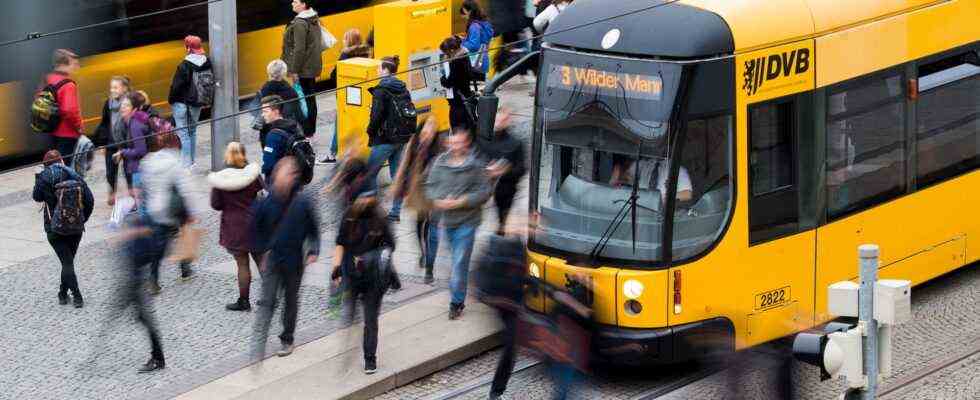Status: 05.11.2021 8:23 a.m.
The Federal Environment Agency calls for the massive expansion of buses and trains in order to achieve climate targets in traffic. Experts are demanding a radical rethink of traffic and higher prices for fossil-fuel cars.
“The tickets are not only too expensive, they are also too complicated,” says Thorsten Koska about local transport. The scientist can hardly be stopped when he reports what is currently going wrong with mobility. He is co-head of the research area Mobility and Transport Policy at the Wuppertal Institute. A radical socio-ecological transformation of the transport system is necessary.
Problematic pricing in public transport
For Koska this means: expansion and promotion of the environmental network consisting of local public transport, rail, sharing systems, bicycle and pedestrian traffic. The problem is the prevailing privilege of the car, which is slowing down the traffic turnaround. “Affordable prices are important. When we are mobile, we opt for the convenient and the inexpensive offer,” says Koska. In the last 20 years, prices in local public transport have risen twice as much as the average costs for car traffic. The federal government would have to co-finance the local public transport and its operation more strongly. Companies that generate a lot of traffic through their employees or logistics should pay money into the system by means of a traffic generation tax.
The ADAC has examined the pricing in local public transport and comes to an astonishing conclusion in the study. The prices of individual tickets differ considerably depending on the city – even though the services included are mostly of the same value. Price differences of up to around 100 percent were found. According to ADAC, a standardization of prices at the lowest possible level would be desirable for the attractiveness of local public transport.
Koska confirms this. At least nationwide tariffs are needed, or better still a “check-in / check-out” system. “This is a kind of smart kilometer tariff, as is common in the Netherlands. The cell phone calculates the route automatically, and you just tell where the journey begins and ends,” says Koska. A flat rate option as a ticket, like in Austria, is also a good idea. “This is a sensible way of changing user behavior in the long term. Once I have a good and cheap ticket, I might leave the car parked more often.”
Activate old railway lines again
A massive expansion of local transport is important, according to the Wuppertal Institute. In the short term, more bus routes that can be used quickly will help. In the medium term, it will be new routes and new rails. Old railway lines could be reactivated in order to gain time here. “We need more capacity and a higher train density. We can achieve this through digital systems and train communication so that we can travel even more safely on the same rail system with more trains,” says expert Koska.
Support comes from the Berlin think tank “Agora Verkehrswende”. Its director Christian Hochfeld is also calling for local public transport to be expanded. There is not a lack of proposals, but of implementation. “For the transport turnaround, it is important to orchestrate many political instruments,” says Hochfeld. “It depends on the policy mix, from the CO2 fleet limit values for cars at EU level to the structuring of mobility on site in the municipalities.”
More flexibility in the country
Hochfeld emphasizes that you cannot get yourself out of the climate crisis. “Expanding local public transport and promoting electromobility or cycling is only one side of the coin. On the other hand, pricing and financing need to be different,” says the expert. “From parking space management in cities to vehicle tax, we have to credit fossil-fueled cars with the costs that they cause to society. At the moment we are still massively subsidizing climate-damaging mobility – ‘keep it up’ is not an option.”
Many offers such as e-scooters or car sharing are primarily to be found in large cities, where it is also profitable for private companies. Flexible offers also belong in the suburbs or the village. Researcher Koska from the Wuppertal Institute cites a ride pooling system such as a collective call taxi 2.0 as an example. “It is flexible and not only drives at certain times of the day. It collects several people, an algorithm plans the route. It is efficient and bundles traffic,” says the scientist. Some municipalities are already trying out the system. A uniform national standard and financial support are needed here in order to use this across the board. Because a real traffic turnaround is long overdue.

